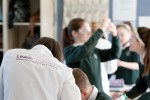Christmas is coming, and the goose is getting fat Royal Institution Christmas Lectures are on their way!
The RSC last week confirmed it would be sponsoring the 2012 Christmas Lectures from the
Royal Institution. The 2012 lectures, titled,
The Modern Alchemist, are presented by
Peter Wothers, FRSC, of the University of Cambridge. The lectures for school children, recorded by the BBC, have been a seasonal fixture since they began in 1825, set up by the self-taught legend of the physical and chemical sciences, Michael Faraday.
Recording took place last week at the Ri's famous lecture theatre in London and was a great success. 16 lucky
ChemNet members attended a preview event earlier in December, and six RSC members and their children attended the three lectures last week. The lectures will be
broadcast on the BBC on the 26th, 27th, and 28th December, and available for up to a week thereafter on iPlayer.
The three lectures take an alchemical theme, with a decidedly modern scientific twist:
Lecture one,
The Elixir of Life, airs on the 26th (Boxing Day),
Lecture two,
The Fountain of Youth, airs on the 27th,
Lecture three,
The Philosopher's Stone, airs on the 28th.
RSC is proud to sponsor the 2012 lectures, not least because our own Fellow, Dr Wothers, is the host. Thanks to our involvement in this year's lectures we'll soon be able to bring you exclusive video content and supporting material from the Christmas lectures, selected for educational audiences, in early 2013.
Further, if you've not yet seen the
Ri's excellent advent calendar, then make sure you have a look at
http://advent.richannel.org/. The interactive advent calendar shows a short video clip every day up to Christmas, featuring a scientist or science communicator waxing lyrical about their favourite element (real and fictional).
From Andrea Sella discussing the filtering powers of didymium lenses, to Mark Miodownik discussing Oxygen, the Ri Channel videos are well worth a look, and worth sharing in the classroom, even after Christmas.
 From the Ri back to the RSC
From the Ri back to the RSC. Learn Chemistry's very own Rosalind Onions is a Christmas star in her home-made festive sweater, featured both in our
excellent Chemistry Christmas song, and on the Guardian's
Christmas sweater online album.
If you're stuck for presents, why not give a great chemistry educator a Christmas gift they won't forget - a nomination for one of the
RSC's prestigious Education Awards. The Periodic Table of Video's Martyn Poliakoff is a previous winner of the Nyholm Prize.
Nominations close on the 15th January, and you can
add your nomination online.
If you're attending the
2013 Association for Science Education conference and show at the University of Reading, be sure to stop by and chat to the team from RSC Education, at
stand CS48. The conference, which begins early enough for heads still to be sore and stomachs full from festive indulgence, open on Thursday 3rd of January. Put it in your diary if you've not already.
But whatever your plans for the new year, have a very merry Christmas and a happy new year from all at RSC Education and Learn Chemistry!
